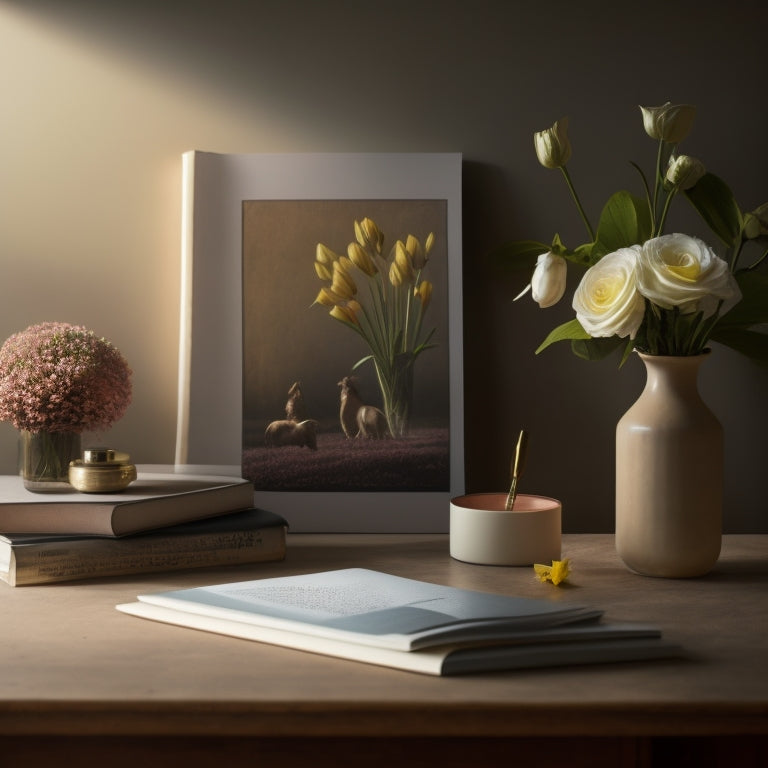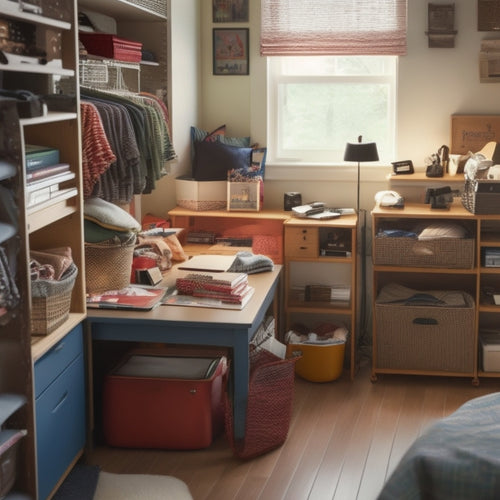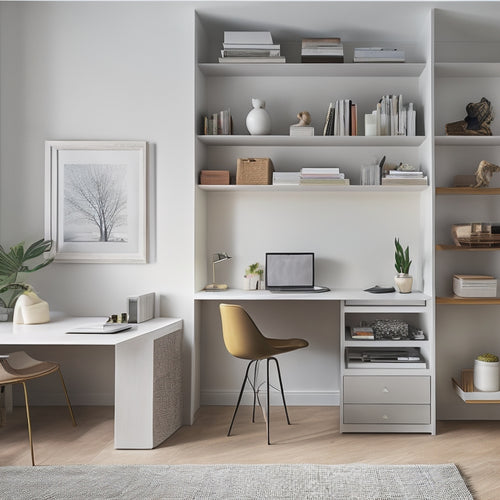
Declutter Like a Pro: Unleash Creativity Now
Share
You're ready to access your creativity, but clutter's holding you back. By simplifying your physical and mental space, you'll open up creative freedom. Start by categorizing items into 'keep,' 'donate,' and 'recycle' piles, and use organization hacks like Post-its to ease decision-making. Identify essential items that add value to your life and make space for them. As you declutter, you'll notice a shift in mindset and a sense of freedom. You'll be able to focus on what truly matters, and that's when creativity can flourish. Now, take the next step and discover the strategies and tips that'll help you maintain a clutter-free space and access your full creative potential.
Key Takeaways
• Simplify your physical and mental space to unlock creative freedom and tap into your full potential.
• Categorize items into 'keep,' 'donate,' and 'recycle' to make decluttering decisions easier and more efficient.
• Organize your workspace and tools logically to enhance focus and reduce distractions, leading to clearer thinking and inspiration.
• Establish habits that support decluttering efforts to maintain a clutter-free environment and foster a haven for imagination and productivity.
• Address digital clutter by unsubscribing from unwanted newsletters, categorizing emails, and organizing computer files to free up mental space for better focus.
Decluttering for Creative Freedom
By simplifying your physical and mental space, you can unlock the freedom to focus on what truly matters, enabling your creativity to flourish and inspiration to strike. Through mindful simplification, you'll create a haven that sparks imagination and productivity.
Start by clearing your workspace of distractions, and then organize your tools and materials in a way that makes sense to you. A clutter-free environment allows you to think more clearly, making it easier to tap into your creative potential.
Strategies for a Clutter-Free Life
Now that you've cleared the path for creative freedom, let's develop a decluttering strategy that will help you maintain a clutter-free life, starting with the rules and systems that Fay Wolf outlines in her book.
To ensure your space stays organized, establishing habits that support your decluttering efforts is crucial. Here are some strategies to get you started:
-
Categorize items: Divide items into categories, such as 'keep,' 'donate,' and 'recycle,' to make decision-making easier.
-
Use organization hacks: Utilize tools like Post-its for labeling and create additional categories to stay on top of clutter.
-
Create a 'Maybe' pile: Set aside items you're unsure about, and revisit them later with a fresh perspective.
- Reclaim necessary items: Identify essential items that bring value to your life and make space for them.
Tips From a Professional Organizer
As a professional organizer, Fay Wolf shares practical tips to help you tackle common decluttering challenges and maintain a clutter-free space. You'll learn effective organizing techniques to transform your workspace into a creative haven.
Fay suggests categorizing items, using Post-its for labeling, and creating a 'Maybe' pile to make decision-making easier. To maximize your creative workspace, try storing kids' artwork digitally and taking photos of memorabilia to free up physical space.
Beyond the Physical Clutter
When you've tackled the physical clutter, it's time to confront the digital and mental clutter that's holding you back from achieving a truly decluttered life.
Digital organization is key to freeing up mental space, allowing you to focus on what really matters.
Here are a few areas to tackle:
-
Email inbox: Unsubscribe from unwanted newsletters and sort emails into clear categories.
-
Computer files: Organize documents into clear folders and consider cloud storage for easy access.
-
Phone apps: Delete unused apps and categorize the rest for easy finding.
- Mental to-do lists: Write down tasks and break them down into manageable chunks for mental clarity.
Starting Your Decluttering Journey
Begin by identifying the areas of your life where clutter is causing the most stress and disorganization, and prioritize those spaces to tackle first.
Don't fall into the trap of trying to declutter your entire life at once - that's a recipe for burnout. Instead, focus on one area at a time, and adopt a decluttering mindset that's ready to let go of the old and make way for the new.
Be honest with yourself about your emotional attachments to certain items, and remember that holding onto them won't bring back the memories. As you make progress, you'll start to notice a shift in your mindset and a sense of freedom from the weight of clutter.
Avoid common beginner mistakes, like getting too attached or feeling guilty about getting rid of gifts, and stay focused on your goal of a clutter-free life.
Frequently Asked Questions
Can I Declutter if I'm Not a Naturally Organized Person?
You're wondering if you can declutter even if you're not naturally organized? Absolutely! It's all about making a mindset shift towards valuing simplicity and clarity.
It's not about being born organized, but about committing to personal growth and creating a system that works for you. Start small, be kind to yourself, and remember that decluttering is a process.
You got this!
How Do I Maintain My Space After the Initial Decluttering Process?
You've decluttered your space, now what? To maintain the tranquility, you need to establish daily habits and commit to ongoing maintenance.
Start by setting aside 10-15 minutes each day to tidy up and tackle any clutter that's crept back in.
Create a schedule to review and adjust your space regularly, whether it's weekly, biweekly, or monthly.
What if My Family Members Resist My Decluttering Efforts?
You're ready to declutter, but your family members are digging in their heels. Don't let their resistance derail your efforts! Approach the situation with empathy and understanding.
Explain how decluttering will benefit the whole family, improving household harmony and reducing stress. Involve them in the process, assigning tasks and making it a team effort.
Can Decluttering Really Help With Anxiety and Depression?
You're wondering if decluttering can really help with anxiety and depression. The answer is yes! By clearing out physical clutter, you'll create space for mental clarity and emotional freedom.
Imagine not feeling overwhelmed by stuff, and instead, having room to breathe and think clearly. Decluttering can be a powerful tool in managing anxiety and depression, allowing you to focus on what truly matters.
Are There Any Decluttering Apps or Tools That You Recommend?
You're drowning in a sea of clutter, and a lifeline of decluttering apps and tools is just what you need!
For digital storage, try Google Drive or Dropbox to digitize your files and free up physical space.
For task automation, apps like Todoist or Habitica can help you stay on top of tasks and decluttering goals.
These tools will be your new BFFs in the decluttering journey, trust us!
Related Posts
-

Why College Students Need Smart Storage Systems
As you navigate the challenges of college life, you'll quickly realize that a smart storage system is essential to tr...
-

7 Essential Strategies for More Storage Space
Take back control of your space by implementing these 7 essential strategies for more storage space. Start by maximiz...

